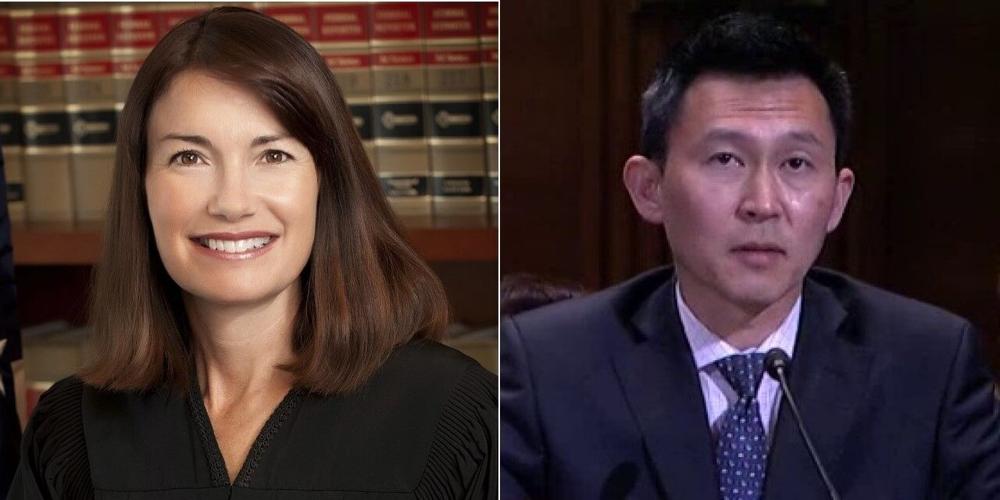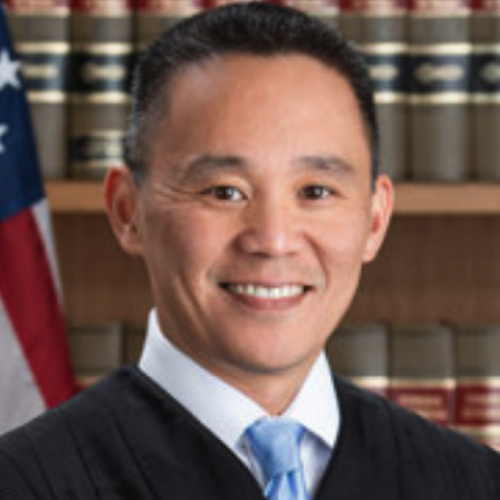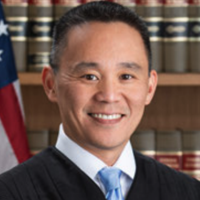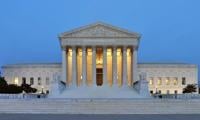
U.S. District Judge Josephine Staton and U.S. Ninth Circuit Court of Appeals Judge Kenneth K. Lee
LOS ANGELES - As a panel of federal judges have moved to block Texas Republicans from carrying out their mid-decade congressional redistricting, the next court battle over the unprecedented wave of partisan gerrymandering appears likely to play out in a Los Angeles federal court, where California Democrats face similar accusations of illegally drawing districts based on race - only in the opposite direction.
On Nov. 18, a three-judge panel of federal judges from the state of Texas ruled 2-1 that the Lone Star state's Republican majority had illegally violated federal voting rights law and the U.S. Constitution by drawing districts that they said discriminated against Hispanic and black voters.
Both groups tend to vote by significant majorities for Democratic candidates, though black voters represent a much more reliable and lopsided Democratic voting bloc than Hispanic voters, particularly in Texas.
Under the redrawn Texas map, the number of majority Hispanic districts increased by one, from seven to eight.
However, the court majority still agreed with Democrats and other critics of the new map that it unlawfully spread those voters - and, Latino voters, specifically - among other majority-white congressional districts, effectively diluting the ability of Hispanic and black voters in those other districts to influence the outcome and potentially elect Hispanic and black representatives to the U.S. House.
The majority said it believed the new districts represented an illegal "racial gerrymander."
Texas has indicated it will appeal the decision directly to the U.S. Supreme Court, as permitted when reviewing such redistricting reviews from a three-judge panel.
The ruling comes a little less than three weeks before another three-judge panel is set to take up a challenge to new congressional maps hurriedly drawn up mid-decade by California Democrats.
Led by Gov. Gavin Newsom, the California Democrats pushed through the new maps quickly to respond to the move by Texas Republicans.
Texas had acted at the urging of the White House under President Donald Trump, who had sought the redistricting in a bid to shore up Republicans' chances of retaining their majority in the U.S. House of Representatives in 2026.
Newsom and California then acted to similarly redraw districts in the largest U.S. state to potentially offset any gains Republicans may make in Texas, the country's second most populous state.
Under the California maps, Democrats have stated their goal to oust at least five, if not all, Republican members of the Golden State's 52-member congressional delegation.
While the Texas state constitution gives the power to draw such districts entirely to state lawmakers, California Democratic lawmakers essentially rewrote their state constitution in mid-stream, seizing power from the state's independent redistricting commission and handing it back to themselves to draw the new congressional map.
Voters then signed off on the partisan power play in approving the ballot measure known as Proposition 50 in a special election earlier this month.

U.S. District Judge Wesley Hsu
Prop 50 drew an immediate legal challenge from California Republicans. They were joined days later by the U.S. Justice Department.
In both filings, the plaintiffs and their White House supporters say the maps approved under Prop 50 also amount to illegal racial gerrymanders.
The claims are the mirror image of those in Texas. While plaintiffs in Texas said the new Republican maps "dilute" Hispanic voters' electoral sway, the plaintiffs in California say the Democratic maps achieve the opposite result, illegally giving Hispanic voters outsized racial heft at the ballot box.
The California challengers noted Golden State Democrats did not even attempt to hide their intentions, publicly boasting of their intent to increase Hispanic voting power, at the expense of white voters and those of other races.
And the challengers said the allegedly illegal race-based changes were made to the map completely without legal justification, as Hispanic voters in California, who make up a little less than 40% of all voters in the state, haven't shown any difficulty in electing Hispanic Californians to Congress.
By contrast, Hispanics amount to 33% of voters in Texas.
"The end result is a map that manipulates district lines in the name of bolstering the voting power of Hispanic Californians because of their race," the Justice Department wrote in its complaint, intervening in the dispute.
"Our Constitution does not tolerate this racial gerrymander."
According to the court docket, the California dispute will be heard by a panel of three federal judges. Those judges will include U.S. District Judge Josephine Staton, an appointee of former President Barack Obama; U.S. District Judge Wesley Hsu, who was appointed by former President Joe Biden; and U.S. Ninth Circuit Court of Appeals Judge Kenneth K. Lee, who was appointed during the first term of President Donald Trump.
In 2019, Staton famously ruled to uphold a California ban on so-called “assault weapons,” ruling that “incredibly effective killing machines” aren’t protected as “arms” by the Second Amendment.
In the Texas case, the matter was heard by U.S. District Judge Jeffrey Brown, a Trump appointee; Obama appointed U.S. District Judge David Guaderrama; and U.S. District Judge Jerry Smith, an appointee of former President Ronald Reagan. Brown and Guaderrama joined in the majority.
Smith has yet to file a dissenting opinion.
As in the Texas case, any ruling from the California panel could be appealed directly to the U.S. Supreme Court.






